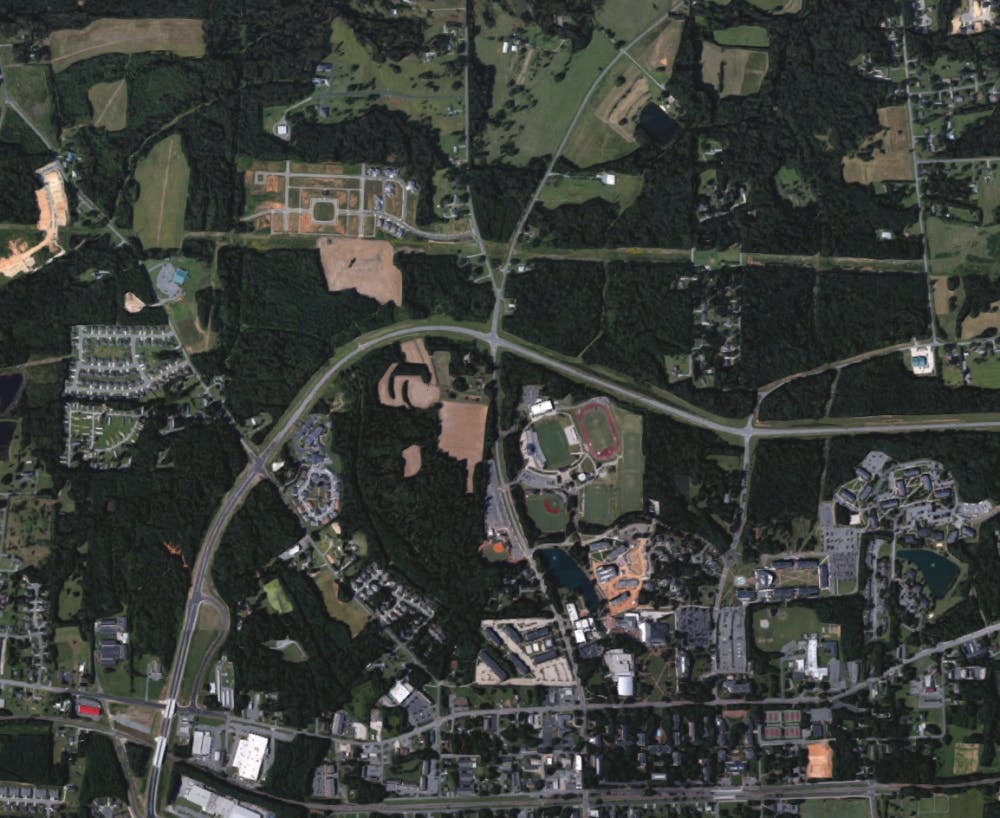EcoPlexus Incorporated, a leading developer of solar-powered energy farms in the United States, has set its sights on a plot of land just outside Elon University, but has been unable to convince the Town of Elon to support its plans.
The 70-acre space that EcoPlexus is seeking to obtain is currently zoned as residential and would need to be deemed rural land in order to be the site of a solar-powered farm. Unfortunately for the San Francisco-based company, Elon’s planning committee voted against rezoning the land in October.
Sean Tencer, a member of the planning board, said that EcoPlexus’ proposal was voted down because it did not fit with the town’s current land-use ordinances. The planning board holds to the belief that this plot is the Town of Elon’s only space to expand and that it needs to remain unclaimed.
EcoPlexus is seeking to appeal the planning board’s ruling and recently gave a presentation to the Board of Aldermen and Mayor Jerry Tolley to convince the council to overturn the judgment.
Nathan Rogers, a utility-scale project developer for EcoPlexus, represented the corporation at the Board of Aldermen. He explained that EcoPlexus’ solar farm would make use of a 30-acre tract of land, although they are asking that 70 acres be rezoned. The extra land is intended to surround the panels at the farm so that a foliage buffer can be cultivated around them. Rogers said that most jurisdictions require a vegetation buffer of at least 10 feet surrounding solar panel plants. The farm is estimated to run about $8.5 million in construction costs, and its address will be 911 North Manning Ave.
If built, this farm will signify EcoPlexus’ 10th successful project. Three of these solar farms would be in North Carolina. This would be Elon’s second solar-powered farm, the first being Elon University’s Loy Farm, which is creating power for Duke Energy.
One of Rogers’ key arguments is the tax benefits that rezoning the land would bring to Elon. His presentation stated that it may generate around $19,000 per year in revenue. He also stresses that the farm would help the environment.
“Solar is safe and environmentally friendly. That’s why it is being adopted worldwide,” Rogers said. “Elon would become a leader in clean energy.”
Additionally, Rogers claimed that the project does not require public services, will provide around 60 new jobs for construction workers in the area, and will not have negative impacts such as noise or odor.
Rogers spent the majority of his presentation playing to the emotional appeal of the project, and highlighting the wants of those living near or invested in the land in question. The area was originally rural before suburbia began developing and encroaching on the farm space. The Johnson family is the current majority owner of the land which EcoPlexus is courting. Willie Johnson, the matriarch of the family, was represented at the Board of Aldermen by her daughter and several other relatives.
“We want our land to stay rural,” Johnson’s daughter said before the board. “We support the environment and clean energy, and my mother wants our land to go to that cause.”
Rogers attempted to contact 10 individuals who live on the border of the plot. While three of them could not be reached, Rogers did speak with seven. Of these, three were unwilling to comment. Rogers attested that while they supported the project, they did not want to make a public or political stance regarding it. The remaining four signed letters to be considered by the Board of Aldermen stating their support for EcoPlexus and the solar-powered farm project.
The Board of Aldermen is expected to vote on EcoPlexus’ rezoning application later in the month. Davis Montgomery, member of the board, will not be voting because he is employed by Duke Energy, a potential partner on the project.
The vote has already been postponed several times as the appeal continues to bounce back and forth between the counsel and the planning board.


